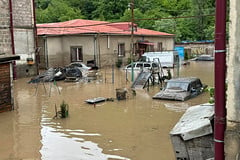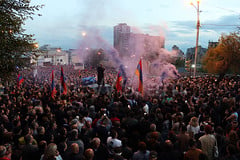
Our bilateral cooperation with one is not directed against anyone else. We are not doing, you know, like black deals or something behind the table with hidden agenda. This was stated by Peter Stano, Lead Spokesperson for Foreign Affairs and Security Policy of the European Commission of the European Union (EU), in an interview with Armenpress—and referring to the Azerbaijani foreign ministry statement where the EU was strongly criticized, and there was even a threat that the EU would receive a corresponding response.
"It's not the European Union which provokes instability. It's not the European Union that makes unilateral military steps. But what we have seen in case of Nagorno-Karabakh, we have seen unilateral military steps, launching of a military operation despite previous assurances that the issue will not be solved militarily. So, one needs to be a little bit also like self-reflective when pointing fingers to others," he said.
Stano added that the EU is working to bring stability to the region to prevent military operations and unilateral steps.
"We are always happy and standing there to be also ready to facilitate or continue facilitating the normalization process between Armenia and Azerbaijan, which was also another thing that came out of the European Union, from the Council in October, and from the ministers meeting this week we called on Armenia and Azerbaijan to resume the negotiations and resolve all the pending issues with the view to conclude the peace treaty, ideally by the end of the year. We are there to support. We cannot, of course, impose, we cannot force anyone. But again, the EU is an honest broker without any hidden agenda. Our only aim is peace, stability and prosperity for everyone," said the European Commission's chief foreign affairs spox.
As for the fact that the Azerbaijani side first declined to attend the meeting in Granada, Spain at the last moment, then the meeting scheduled for the end of October in Brussels, Stato said: “Our role as the facilitator or mediator is not really to commend the behavior of one side or another. Our role and our efforts are focused on being there for both parties, as long as they are willing, to help them to find solutions. We are facilitators. We cannot impose, we cannot force. We do our best. We offer our capacities, our energies, our time, sometimes also our resources to make sure that the engagement continues. And when the parties are ready, then we mediate the specific meetings. But even despite the fact that what you mentioned about the meetings at the higher level that have been cancelled, the engagement is still going on, you know. So, we have a lot of bilateral engagements, both with Armenian partners with Azerbaijani partners, both in Brussels and on the ground in Baku, in Yerevan. So, I mean, we try to do our best. Again, encouraging parties to get together, to have the meetings, the sooner the better, and I think this was also captured, this political expectation of the European Union was captured in the call from the Foreign Affairs Council this week, when the High Representative said that we call for the resumption of negotiations and we want to see them continue and we stand ready to continue offering our services in this process, because in the end it was both parties who turned to us after they realized that Russia is not an honest broker, after they realized that you cannot really rely on Russia, because Russia has its hidden agenda. And in the case of Armenia, Russia failed hugely to deliver on its commitments to Armenia. So, we are there because we are an honest broker, we will do our best because our best motivation or strongest motivation is our own history."






















